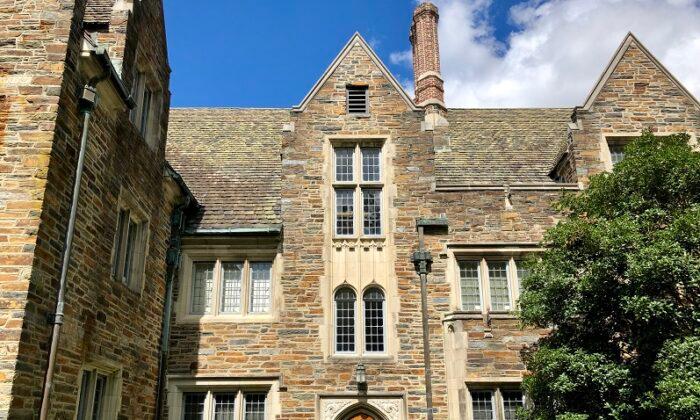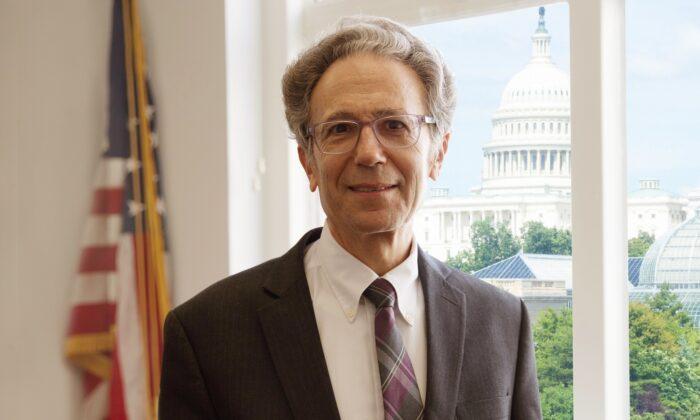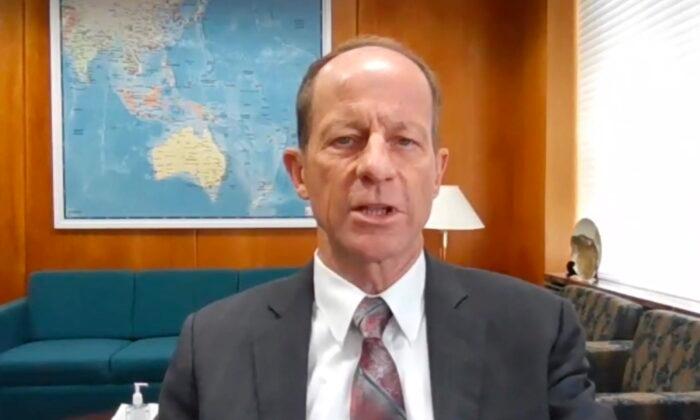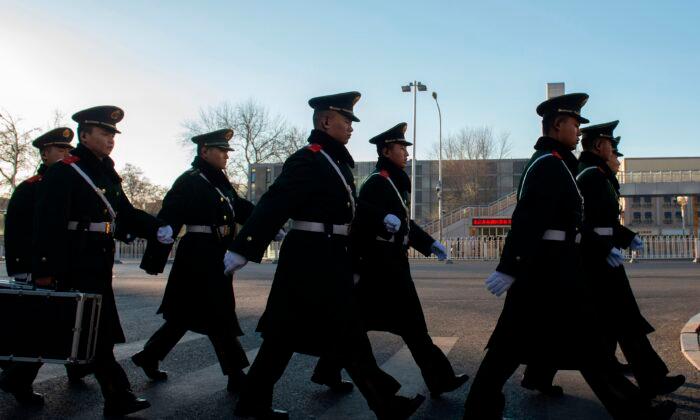The spread and depth of China’s engagement in commerce, education, media, the military, security, and telecommunications in the 54 countries of Africa go far beyond the scope of mining interests on that continent that foreign powers have coveted for centuries.
“China has positioned itself to become a strategic partner to Africa,” Paul Nantulya, of the African Center for Strategic Studies, told the U.S.-China Economic and Security Review Commission (USCC) at a hearing held May 8.
For Africans, partnering with China comes with few conditions.
“China doesn’t have political strings attached, in terms of criteria that African countries must meet,” said Yun Sun, director of the China Program at the Stimson Center, a Washington think tank.
Indeed, China’s inroads into Africa have been ideological as well as economic, Nantulya said.
China’s Military Embedded Throughout Africa
Nantulya illustrated his point with a review of recent events.“In the past six months,” Nantulya said, “China has delivered tanks to Nigeria, helped Ethiopia and Sudan launch satellites, [and] conducted military exercises with the South African and Tanzanian military.”
In Zimbabwe, Chinese representatives “attended a pass-out ceremony of junior officers trained by the PLA [the People’s Liberation Army of China] at Zimbabwe’s top college,” while in Namibia, the PLA “inaugurated Namibia’s new Command and Staff College.
Meanwhile, the PLA opened Africa’s first integrated public security center in Angola, Nantulya said.
The close relationships between Africa’s armed forces and China have historical roots, he says.
African “liberation movements ... were trained by the PLA from inception,” he said, and those ties “remain pivotal to China’s strategic influence.”
Nantulya is referring to the independence movements in Africa that sought, in conjunction with their military wings, to overthrow colonialism throughout the continent during the post-World War II era.
He says many of those movements turned to the PLA “for basic army building, once in power,” and as a result, “many share fundamental traditions, ideology, and doctrine with the PLA.”
Chinese arms sales to African nations are easily facilitated by three key factors, Nantulya said. First, China turns a blind eye to a country’s “domestic dynamics, including sanctions.” Second, China offers ”friendly pricing.” Third, “flexible financing” makes payment terms easy for purchasers.
Along with domestic training of African armed forces, “2,000 officers across 40 African countries train in China annually, with the numbers from French-speaking West African countries growing exponentially,” Nantulya said.
While Africans favor an education in the United States for “strategic and senior levels” of their armed forces, considering it a “key for career advancement,” Africans think highly of China as the source of training of NCOs and junior officers, and technical subjects, Nantulya said.
Practical training is backed up by ideological education in PLA political schools, which foster the idea that “the uniform serves the party before the state, a notion directly opposed to the Western principle of an apolitical military,” he continued.
China’s Presence
Yun Sun, a graduate of the Chinese Foreign Ministry’s Foreign Affairs College in Beijing, testified that “the level of attention which China attaches to Africa is simply massive compared to the U.S.”And its model is supported by the fact that the Chinese “are there.”
The effects of the Chinese resident population throughout Africa are bolstered by numerous visits of Chinese government and military officials each year, Sun said.
That Chinese presence includes a security component.
China protects its interests, assets, and people in the nations of its closest diplomatic partners “through the use of China’s other armed forces, such as the People’s Armed Police,” Nantulya said.
The People’s Armed Police, or “wujing” in Chinese, is a paramilitary security force responsible throughout China for internal security, anti-terrorism, riot control, and other major threats to China’s stability. The force reports to the highest level of China’s military, the Central Military Commission, and, since the 2018 military reform in China, to the Central Committee of the Chinese Communist Party.
Ethiopia, Kenya, Nigeria, Namibia, Mozambique, and South Africa are in the tier of countries to which China would, and does, send its paramilitary force, Nantulya added. Uganda, among their ranks, chooses to use its security forces to protect Chinese assets on its soil, he added.
Appealing to African Elites
Sun, when asked how the United States could counterbalance the Chinese influence in Africa, said that “a lot of African elites find the Chinese approach to be quite appealing.”“So, the strength of the U.S. side has to lie with society,” she continued, indicating that America has to win the hearts and minds of the African people in order to gain influence on the continent.
“We have to understand what is happening between Chinese elites and African elites, [who] find the Chinese approach to be convenient and expedient,” she said.
What China Wants
China’s overwhelming interest in Africa is, of course, its desire to control the rich and abundant natural resources of the continent, witnesses at the hearing agreed. To that end, China is mirroring the European exploitation of the continent, which began in the 15th century.The United Nations Environment Programme (UNEP) states that Africa “holds a huge proportion of the world’s natural resources, both renewables and non-renewables.”
“Africa is home to some 30 percent of the world’s mineral reserves,” along with 12 percent of the world’s oil reserves, according to U.N. statistics. “It also has 40 percent of the world’s gold, up to 90 percent of its chromium and platinum, and holds the largest reserves of cobalt, diamonds, platinum, and uranium in the world.”
Critically, the U.N. figures show that those natural resources comprise 30 to 50 percent of the total wealth of most African countries.
Sun said that second to China’s desire to acquire the natural resources of Africa, the country has also “been looking for places to shift supply chains.” Along with Southeast Asia, China considers Africa as a destination for that relocation, which hasn’t yet occurred.
“The Chinese first need to have the infrastructure” to support the move of industrial capacity, as well as access to and movement of natural resources. In her discussions with Chinese officials, Sun said she’s been told, “that’s why they are investing in it.”
Additionally, China wants Africa’s market for Chinese goods and services, as well as the political support that most African countries provide China in international institutions, the experts agreed.
Media and Telecoms
China’s “vast media enterprise amplifies its message” in Africa, Nantulya told the commissioners.“In Nairobi, 500 journalists and staff generate 1,800 news items monthly from Xinhua’s Africa bureau,” he said.
China Global Television (CGT) and China Radio International both broadcast from Nairobi, Kenya. Viewers and listeners can access their content 19 hours each day in Chinese, English, and Swahili, Nantulya said.
The second-largest digital television provider on the continent is China’s Star Times, which distributes Chinese content to 10 million subscribers in 30 countries, he said.
Xinhua, China’s state-owned and operated news agency, has an agreement with Kenya’s Nation Media that gives it “access to 18 media brands, 28 million social media followers, 11 million multi-pay views, and 90,000 daily newspaper circulation in east and central Africa,” he said.
Chinese telecommunications companies Huawei and ZTE, both of which have strong ties to the Beijing regime, dominate the infrastructure of telecommunications throughout China, according to Aubrey Hruby, a senior fellow at Atlantic Council.
“Huawei has built roughly 70 percent of the continent’s 4G network,” she added.
America’s Opportunity
“While I do believe there are some challenges to the Chinese commercial footprint in African markets and how fast it’s evolved, I don’t know that I see a world of total domination,” Hruby said. “Instead, I see that African countries have greater choice than they’ve ever had in terms of partners, and their needs are enormous.”The United States needs to “really double-down in our areas of competitiveness,“ Hruby said. ”We need to continue to be a world leader in media and entertainment. Hollywood, Nollywood [Nigeria’s film industry]—those kinds of partnerships shape the world view, the frame of mind, of millions and millions of African young people. These kinds of things are our assets and we’ve been lazy about ... finding ways to collaborate.”
America must figure out “how to mobilize financing of the creative industries. Why isn’t there a Hollywood/Nollywood task force that’s for looking for partnerships between the film industries in African markets and Hollywood?”
There are opportunities for the United States in Africa, and realizing them can counter Chinese influence, Hruby said.
America should do “things that align with the aspirations of Africa’s youth, which are going to be a billion young people—one in four workers globally—which is something that we’ve always done well,” she said.




